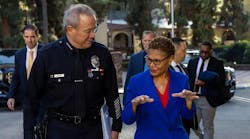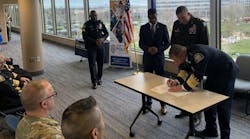I have been a police trainer for over 20 years now but I still consider myself primarily a student. I'm always looking for new and better research, information, and people that I can look toward to help me improve both as a practitioner and as a speaker. Fortunately, I'm married to one of the most brilliant and curious guys on the planet; believe me, if Amazon.com doesn't hear from Dave "Buck Savage" Smith at least twice a week, they start calling our house to make sure he's okay. So I take full advantage of the boxes of books and hours of audiotape that come into our house on a regular basis and try to share as much as I can with my own students and readers.
I began teaching Career Survival for Women in the late 1980s, and now Dave and I present the Street Survival for Women seminar as well as many other gender-specific police and corporate training programs we've developed over the years. I'm always amazed at how truly hungry the women (and the men!) seem for the information we provide, and I'm amused at the occasional monitors who take offense at the mere mention of gender differences in police work. Here are just a few of the topics that get people really excited and sometimes a bit fired up.
Admitting There Are Differences
For many years we were strongly discouraged from talking about the differences between the sexes, especially in law enforcement. Weren't we all equal? Does different mean at a disadvantage? So many of us women had worked so hard at being one of the boys that frankly, we didn't want to give that up. Admitting that there were differences somehow seemed to diminish us in some people's eyes, including our own. Yet, we need to acknowledge and study the differences between men and women to make us better, safer, more optimistic cops. Whether we're talking about brain function, physiology, tactics, or even personal relationships, we've got to throw out political correctness and deal with facts, and the fact remains that men and women are different!
Equipment and Training
I was teaching Career and Tactical Survival for Women a few months ago when a male firearms instructor (yes, lots of guys come to these classes!) raised his hand to express his frustration at being forced to "wash out" several female recruits who had been unable to qualify with the department handgun. This poor guy had tried absolutely everything and he felt that he had somehow failed as trainer. I asked him a couple of questions and discovered that while his agency was running a good firearms program, the sheriff was inflexible when it came to the chosen duty gun.
Any small-handed officer, male or female, was likely to have some difficulty properly accessing the trigger of this particular firearm. I had the same problem for the first 10 years of my own career with my old Smith & Wesson model 59; my hands were just too small for that damn gun. My firearms instructors worked with me and taught me how to compensate, but I was never 100 % comfortable or very accurate with that pistol; I could barely pass my quarterly qualifications. It took a new chief (who allowed us a broad range of pistols to choose from) and about 15 years of experience before I could re-learn how to love firearms. There is no reason for women (or anyone for that matter) to be issued a pistol that doesn’t fit their hand, or any other equipment that doesn't allow them to perform at their peak. Women have shorter torsos, wider hips, and our gun belts sit above our hips. We need guns and equipment that fit our hands and our bodies; period.
Communication and Conflict
Are men and women different in the way we communicate? You can stop laughing now; any idiot knows that we are. We are especially different when it comes to the way we talk with, listen to and deal with each other at work. Law enforcement is still a male-dominated profession, and yet men are often subjected to sensitivity training that instructs them how to work well with women. I don't find this particularly fair. I encourage women, especially trainers and supervisors, to study and understand the way the male brain and body work too. Guys aren't the enemy and forcing them to constantly adjust to the women just leads to resentment. What we need, and what Dave and I teach, is to understand and appreciate each other's differences.
Now, does this mean we're all going to hold hands and sing Kum Ba Ya? Not on your life! Police work is a tough world, people say ignorant things to us all the time; and yes, we often say stupid, offensive things to each other. But as two of the premier male/female communication experts, Barbara and Allen Pease, say being offended is a choice. Men and women are very different when it comes to using humor, engaging in personal discussions, and arguing with each other. Men sometimes need to think twice before they open their mouths in front of women, but there are plenty of women who need to stop looking to be offended and just deal head-on with a statement or a joke or a gesture they don't like. If pulling a fellow officer aside and saying "that was a really stupid thing you just said to me and I don't appreciate it; don't do it again" doesn't work, take it to the next level, but first try to resolve it on your own if at all possible.
As the Pease's say, sometimes "choosing offence tells the world we are unable to come to terms the problem addressed by the comment." As I continue to train and write about gender-specific issues in law enforcement, I always have a few men and a few women who are angry, upset, or offended about something I have to say. To those folks I say this: do your research, look at the science, and lighten the heck up, life is too short. Law enforcement is a family; we are brothers and sisters in this profession and we’re all trying to do a difficult, dangerous job. Spend a little less time looking to be offended and a little more time looking in the mirror asking yourself "what can I do to make this job, and this situation, better?"


